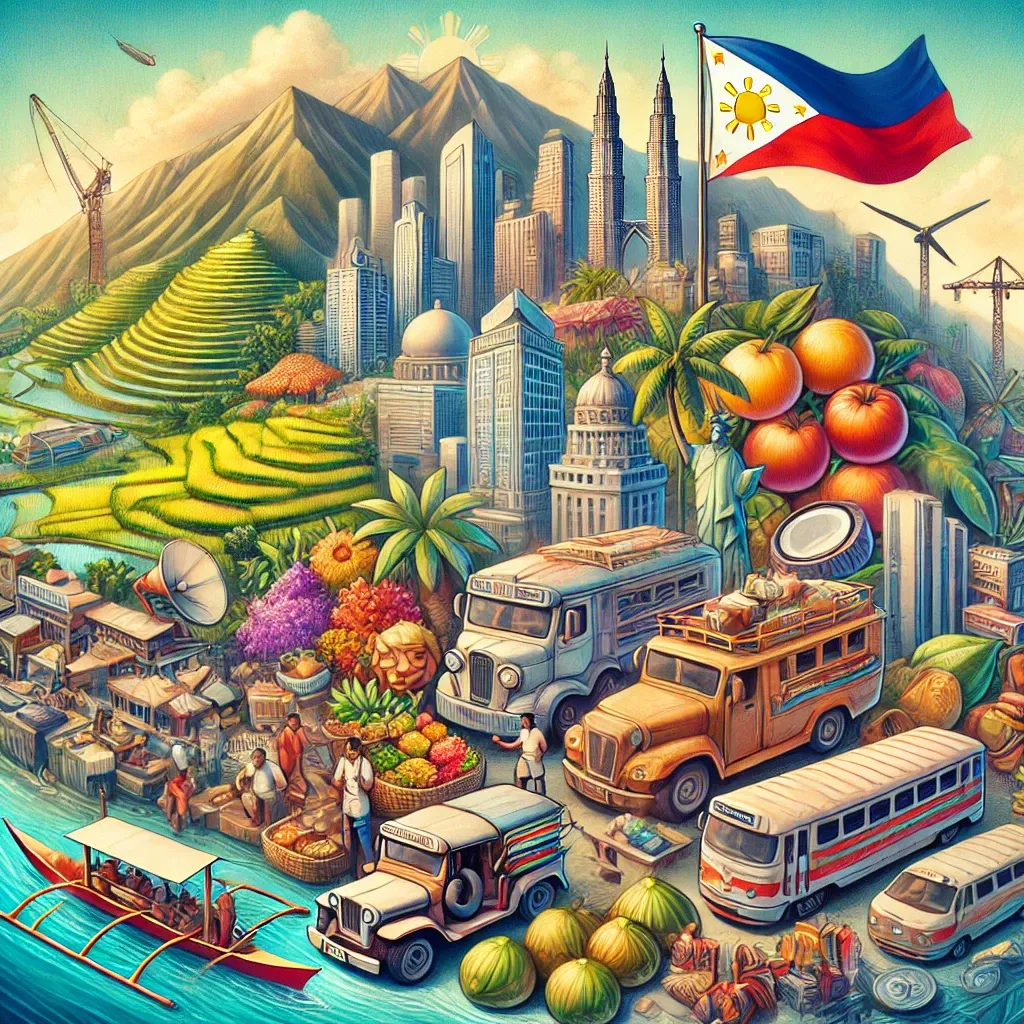Economic Report Philippines
The Philippines, a middle-income developing country, has emerged as a key player in the global economy due to its growing service sector, strong remittance inflows, and youthful population.

Introduction
The Philippines, a middle-income developing country, has emerged as a key player in the global economy due to its growing service sector, strong remittance inflows, and youthful population. However, challenges such as income inequality, infrastructure gaps, and vulnerability to external shocks threaten its long-term trajectory. This report examines the key factors shaping the Philippine economy and society, focusing on labour dynamics, migration, energy, and innovation.
Key Findings
1. Economic Performance
- The Philippines has experienced consistent GDP growth averaging 6–7% annually over the last decade, largely driven by domestic consumption and remittances.
- The services sector, particularly Business Process Outsourcing (BPO), is a major contributor to GDP.
- Despite growth, poverty and income inequality remain prevalent, with significant disparities between urban and rural areas.
2. Labour Force and Demographics
- The Philippines benefits from a young and growing population, with a median age of 25.
- Unemployment and underemployment are persistent issues, particularly among young workers and in rural areas.
- Informal employment accounts for a large portion of the workforce, limiting access to benefits and social protections.
3. Migration Dynamics
- Overseas Filipino Workers (OFWs) play a crucial role in the economy, sending remittances equivalent to 9–10% of GDP.
- High-skilled migration, particularly in healthcare and engineering, contributes to a brain drain, limiting domestic capacity in key sectors.
- Internal migration from rural to urban areas fuels rapid urbanization but exacerbates housing shortages and congestion in cities like Metro Manila.
4. Energy and Infrastructure
- The Philippines is highly dependent on imported fossil fuels, making it vulnerable to global energy price fluctuations.
- Renewable energy potential, particularly solar, wind, and geothermal, is underutilized.
- Infrastructure development has accelerated in recent years through initiatives like "Build, Build, Build," but progress is uneven, with rural areas lagging behind.
5. Innovation and Technology
- The Philippines ranks low in global innovation indices, with limited investment in research and development (R&D).
- The BPO sector has leveraged technology effectively but remains focused on low- to mid-value services.
- Digital infrastructure is improving but still lags behind regional peers, hindering e-commerce and tech entrepreneurship.
6. Social and Economic Disparities
- Urban-rural divides are stark, with rural poverty rates significantly higher than urban areas.
- Access to quality healthcare and education remains a challenge, especially in remote regions.
- Rising inflation and stagnant wages reduce the purchasing power of low- and middle-income households.
Key Areas of Focus
1. Labour Dynamics
- Youth unemployment and underemployment need targeted interventions to enhance productivity.
- Informal workers require social protections and pathways to formal employment.
2. Migration Policy
- While remittances are vital, strategies to address brain drain and retain skilled professionals are necessary.
- Policies to manage rapid urbanization and support rural development can alleviate pressure on cities.
3. Energy Transition
- Overreliance on imported fossil fuels necessitates a faster shift to renewable energy.
- Improved energy infrastructure is critical for economic growth and reducing regional disparities.
4. Innovation Ecosystem
- Increased investment in R&D and digital infrastructure is essential to diversify beyond the BPO sector.
- Support for startups and small businesses can stimulate entrepreneurship and technological advancement.
5. Social Equity
- Expanding access to healthcare, education, and affordable housing is critical to bridging social and economic gaps.
- Strengthening social safety nets can reduce vulnerability to economic shocks.
Opportunities for Improvement
Labour Force
- Policy Action: Expand vocational training programs aligned with industry needs.
- Private Sector Role: Partner with educational institutions to create apprenticeships and on-the-job training.
Migration
- Policy Action: Incentivize skilled professionals to return through competitive wages and better working conditions.
- Private Sector Role: Develop regional hubs to decentralize economic opportunities and reduce urban congestion.
Energy Transition
- Policy Action: Accelerate renewable energy projects with government subsidies and incentives.
- Private Sector Role: Invest in green energy technologies and localized energy solutions for rural areas.
Innovation
- Policy Action: Increase public funding for R&D and establish technology parks to foster innovation.
- Private Sector Role: Support tech startups through venture capital and mentorship programs.
Social Equity
- Policy Action: Enhance rural infrastructure and access to public services.
- Private Sector Role: Invest in community development projects and inclusive hiring practices.
Comparative Insights
- Unlike the EU and the USA, the Philippines relies heavily on remittances, making its economy vulnerable to external shocks affecting OFWs.
- Compared to China, the Philippines has a more youthful population but lags in industrial capacity and innovation.
- Regional disparities are more pronounced than in many advanced economies, requiring targeted rural development initiatives.
Conclusion
The Philippines has significant growth potential, supported by its young workforce, dynamic service sector, and abundant natural resources. However, sustaining this growth will require addressing structural issues like brain drain, energy dependency, and social disparities. By investing in innovation, infrastructure, and rural development, the Philippines can build a more resilient and inclusive economy, positioning itself as a competitive player in the global market.
